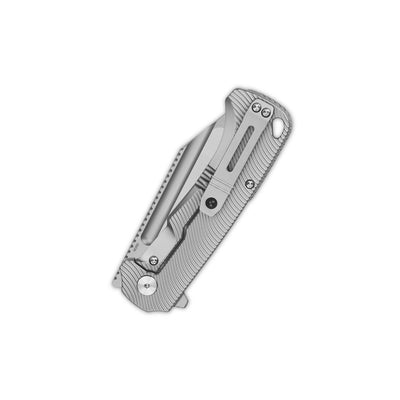The frame lock knife has become a staple in the world of folding knives, known for its robust design and reliability. But how did this innovative locking mechanism come to be? In this article, we will delve into the history, design, and functionality of frame lock knives, providing a comprehensive understanding for enthusiasts and newcomers alike.

Understanding the Frame Lock Mechanism
The frame lock knife utilizes a unique locking mechanism that distinguishes it from other types of folding knives. Unlike traditional liner locks, which use a separate piece of metal to secure the blade, the frame lock integrates the handle itself into the locking system. This design not only enhances strength but also reduces the overall weight of the knife.
- Durability: The frame lock is typically made from a single piece of titanium or stainless steel, offering superior strength.
- Ease of Use: Engaging and disengaging the lock is straightforward, making it user-friendly.
- Safety: When properly designed, frame locks provide a secure hold on the blade, minimizing the risk of accidental closure.
The Historical Context of Frame Lock Knives
The history of the frame lock knife can be traced back to the late 20th century. Although folding knives have existed for centuries, the frame lock was popularized by renowned knife maker Chris Reeve in the early 1990s. His innovative design revolutionized the folding knife industry, leading to widespread adoption among manufacturers and collectors.
Why did the frame lock gain such popularity? The answer lies in its combination of functionality and aesthetics. The sleek lines and sturdy construction appealed to both practical users and collectors. As a result, many modern knife makers have adopted this design, leading to a diverse range of frame lock knives available today.
Design Features of Frame Lock Knives
When examining the frame lock knife, several design features stand out:
- Material: Most frame locks are crafted from high-quality materials such as titanium or stainless steel, ensuring longevity.
- Blade Types: Frame lock knives come with various blade shapes and edge types, catering to different user needs.
- Ergonomics: Many designs focus on user comfort, featuring contoured handles that fit snugly in the hand.
These features contribute to the knife's overall performance, making it a preferred choice for outdoor enthusiasts, collectors, and everyday users alike.
Choosing the Right Frame Lock Knife
When selecting a frame lock knife, consider the following factors:
- Purpose: Determine whether you need the knife for everyday carry, outdoor activities, or as a collector's item.
- Size: Choose a size that fits comfortably in your hand and meets your specific needs.
- Budget: Frame lock knives are available at various price points, so establish a budget before shopping.
By understanding these elements, you can make an informed decision that aligns with your requirements.
Conclusion
The frame lock knife represents a significant advancement in knife design, combining strength, safety, and ease of use. Its evolution from a niche innovation to a mainstream choice reflects its effectiveness and appeal. Whether you are a seasoned collector or a first-time buyer, appreciating the history and design of frame lock knives can enhance your experience and understanding of this remarkable tool.








